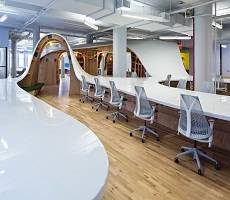June 10, 2014
Physiotherapists warn that poor work habits are damaging staff health
 Physiotherapists are warning employers that bad working habits are damaging workers’ health. A survey by the Chartered Society of Physiotherapy (CSP) found that one in five people (21%) worked through their lunch every day. Of those who do manage to take a break, 48 per cent said they ate at their desk. Only 19 per cent leave their workplace to go outside for a break, and only three per cent go to the gym, meaning most miss out on any kind of physical activity during the day. Investment in staff health and wellbeing makes good business sense for employers says the CSP, which is calling on them to find ways to support staff to be more physically active during the working day in order to reduce their risk of developing musculoskeletal problems like back and neck pain and more serious illnesses such as cancer, heart disease and stroke. More →
Physiotherapists are warning employers that bad working habits are damaging workers’ health. A survey by the Chartered Society of Physiotherapy (CSP) found that one in five people (21%) worked through their lunch every day. Of those who do manage to take a break, 48 per cent said they ate at their desk. Only 19 per cent leave their workplace to go outside for a break, and only three per cent go to the gym, meaning most miss out on any kind of physical activity during the day. Investment in staff health and wellbeing makes good business sense for employers says the CSP, which is calling on them to find ways to support staff to be more physically active during the working day in order to reduce their risk of developing musculoskeletal problems like back and neck pain and more serious illnesses such as cancer, heart disease and stroke. More →























May 16, 2014
We need to add another dimension to meet the stress management challenge
by Mark Eltringham • Comment, Workplace, Workplace design
More →